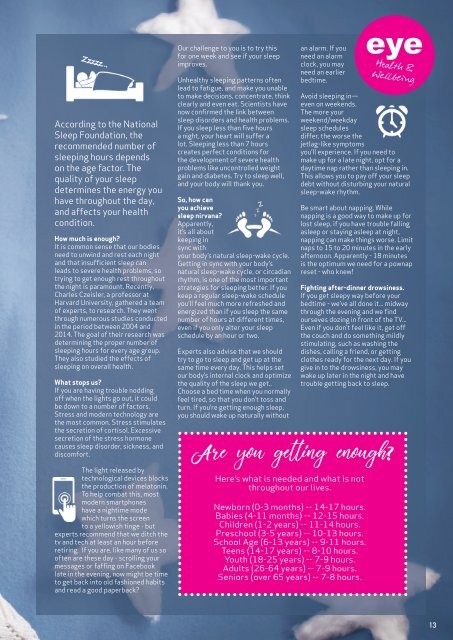Issue 62 October 2017 Village Eye
Create successful ePaper yourself
Turn your PDF publications into a flip-book with our unique Google optimized e-Paper software.
According to the National<br />
Sleep Foundation, the<br />
recommended number of<br />
sleeping hours depends<br />
on the age factor. The<br />
quality of your sleep<br />
determines the energy you<br />
have throughout the day,<br />
and affects your health<br />
condition.<br />
How much is enough?<br />
It is common sense that our bodies<br />
need to unwind and rest each night<br />
and that insufficient sleep can<br />
leads to severe health problems, so<br />
trying to get enough rest throughout<br />
the night is paramount. Recently,<br />
Charles Czeisler, a professor at<br />
Harvard University, gathered a team<br />
of experts, to research. They went<br />
through numerous studies conducted<br />
in the period between 2004 and<br />
2014. The goal of their research was<br />
determining the proper number of<br />
sleeping hours for every age group.<br />
They also studied the effects of<br />
sleeping on overall health.<br />
What stops us?<br />
If you are having trouble nodding<br />
off when the lights go out, it could<br />
be down to a number of factors.<br />
Stress and modern technology are<br />
the most common. Stress stimulates<br />
the secretion of cortisol. Excessive<br />
secretion of the stress hormone<br />
causes sleep disorder, sickness, and<br />
discomfort.<br />
The light released by<br />
technological devices blocks<br />
the production of melatonin.<br />
To help combat this, most<br />
modern smartphones<br />
have a nightime mode<br />
which turns the screen<br />
to a yellowish tinge - but<br />
experts recommend that we ditch the<br />
tv and tech at least an hour before<br />
retiring. If you are, like many of us so<br />
often are these day - scrolling your<br />
messages or faffing on Facebook<br />
late in the evening, now might be time<br />
to get back into old fashioned habits<br />
and read a good paperback?<br />
Our challenge to you is to try this<br />
for one week and see if your sleep<br />
improves.<br />
Unhealthy sleeping patterns often<br />
lead to fatigue, and make you unable<br />
to make decisions, concentrate, think<br />
clearly and even eat. Scientists have<br />
now confirmed the link between<br />
sleep disorders and health problems.<br />
If you sleep less than five hours<br />
a night, your heart will suffer a<br />
lot. Sleeping less than 7 hours<br />
creates perfect conditions for<br />
the development of severe health<br />
problems like uncontrolled weight<br />
gain and diabetes. Try to sleep well,<br />
and your body will thank you.<br />
So, how can<br />
you achieve<br />
sleep nirvana?<br />
Apparently,<br />
it’s all about<br />
keeping in<br />
sync with<br />
your body’s natural sleep-wake cycle.<br />
Getting in sync with your body’s<br />
natural sleep-wake cycle, or circadian<br />
rhythm, is one of the most important<br />
strategies for sleeping better. If you<br />
keep a regular sleep-wake schedule<br />
you’ll feel much more refreshed and<br />
energized than if you sleep the same<br />
number of hours at different times,<br />
even if you only alter your sleep<br />
schedule by an hour or two.<br />
Experts also advise that we should<br />
try to go to sleep and get up at the<br />
same time every day. This helps set<br />
our body’s internal clock and optimize<br />
the quality of the sleep we get..<br />
Choose a bed time when you normally<br />
feel tired, so that you don’t toss and<br />
turn. If you’re getting enough sleep,<br />
you should wake up naturally without<br />
an alarm. If you<br />
need an alarm<br />
clock, you may<br />
need an earlier<br />
bedtime.<br />
Avoid sleeping in—<br />
even on weekends.<br />
The more your<br />
weekend/weekday<br />
sleep schedules<br />
differ, the worse the<br />
jetlag-like symptoms<br />
you’ll experience. If you need to<br />
make up for a late night, opt for a<br />
daytime nap rather than sleeping in.<br />
This allows you to pay off your sleep<br />
debt without disturbing your natural<br />
sleep-wake rhythm.<br />
Be smart about napping. While<br />
napping is a good way to make up for<br />
lost sleep, if you have trouble falling<br />
asleep or staying asleep at night,<br />
napping can make things worse. Limit<br />
naps to 15 to 20 minutes in the early<br />
afternoon. Apparently - 18 minutes<br />
is the optimum we need for a pownap<br />
reset - who knew!<br />
Fighting after-dinner drowsiness.<br />
If you get sleepy way before your<br />
bedtime - we’ve all done it... midway<br />
through the evening and we find<br />
ourseves dozing in front of the TV...<br />
Even if you don’t feel like it, get off<br />
the couch and do something mildly<br />
stimulating, such as washing the<br />
dishes, calling a friend, or getting<br />
clothes ready for the next day. If you<br />
give in to the drowsiness, you may<br />
wake up later in the night and have<br />
trouble getting back to sleep.<br />
Here’s what is needed and what is not<br />
throughout our lives.<br />
Newborn (0-3 months) -- 14-17 hours.<br />
Babies (4-11 months) -- 12-15 hours.<br />
Children (1-2 years) -- 11-14 hours.<br />
Preschool (3-5 years) -- 10-13 hours.<br />
School Age (6-13 years) -- 9-11 hours.<br />
Teens (14-17 years) -- 8-10 hours.<br />
Youth (18-25 years) -- 7-9 hours.<br />
Adults (26-64 years) -- 7-9 hours.<br />
Seniors (over 65 years) -- 7-8 hours.<br />
eye<br />
Heah &<br />
Wlb<br />
Are you getting enough?<br />
13<br />
<strong>Issue</strong> <strong>62</strong> <strong>October</strong> D <strong>2017</strong>(Paul).indd 13 19/09/<strong>2017</strong> 17:30


